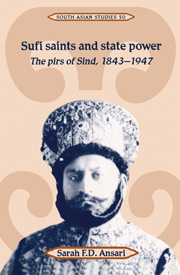Book contents
- Frontmatter
- Contents
- List of illustrations
- Acknowledgements
- A note on spelling
- List of abbreviations
- Glossary
- Introduction
- 1 Sind and its pirs up to 1843
- 2 Creating a system of political control after 1843
- 3 Challenge to the system: the Pir Pagaro and the Hur rebellion of the 1890s
- 4 Challenge to the system: the Khilafat movement, 1919–1924
- 5 A more complex system of political control: pirs and politics under the raj, 1900–1947
- 6 The final challenge: the Pir Pagaro again
- Epilogue
- Conclusion
- Select bibliography
- Index
- Cambridge South Asian Studies
Introduction
Published online by Cambridge University Press: 01 October 2009
- Frontmatter
- Contents
- List of illustrations
- Acknowledgements
- A note on spelling
- List of abbreviations
- Glossary
- Introduction
- 1 Sind and its pirs up to 1843
- 2 Creating a system of political control after 1843
- 3 Challenge to the system: the Pir Pagaro and the Hur rebellion of the 1890s
- 4 Challenge to the system: the Khilafat movement, 1919–1924
- 5 A more complex system of political control: pirs and politics under the raj, 1900–1947
- 6 The final challenge: the Pir Pagaro again
- Epilogue
- Conclusion
- Select bibliography
- Index
- Cambridge South Asian Studies
Summary
A major area of historical concern in recent years has been the investigation of how European powers established and maintained their colonial empires. As research has probed further, western rule itself has come to be portrayed in a new light. Interest has shifted from identifying metropolitan ‘responsibility’ for empire-building to specific local factors which ‘encouraged’ and ‘sustained’ colonial rule. While a combination of economic, military and technical factors is seen to have made empire possible, other factors are thought to have made it a working proposition. Theories of peripheral imperialism have appeared to challenge so-called ‘Eurocentric’ explanations: rather than regarding colonial expansion as primarily the outcome of processes within the various European states involved, they instead place the origins of and main impetus for formal imperialism in crises which occurred in the overseas territories themselves.
Robinson and Gallagher led the way in the late 1950s when they observed that theorists of imperialism had been looking for answers in the wrong places by scanning Europe for causes when it was in Africa that the crucial changes had taken place. Fieldhouse subsequently transformed this observation into a theory with his argument that full-blown colonial rule resulted from the need to fill the vacuum of power which followed the collapse of more-or-less informal methods of cooperation between native élites and Europeans. Robinson reinforced this trend by outlining a model of imperial control which, just as emphatic in its rejection of traditional Eurocentrism, stressed the importance of the relationships which colonial rules established with indigenous powerholders both before and after empire was made formal.
- Type
- Chapter
- Information
- Sufi Saints and State PowerThe Pirs of Sind, 1843–1947, pp. 1 - 8Publisher: Cambridge University PressPrint publication year: 1992



